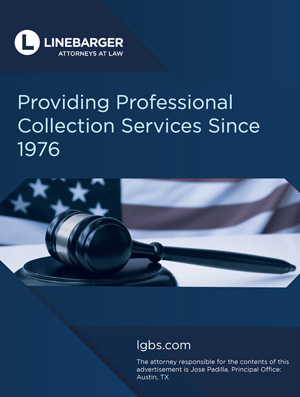Dawn Palermo
Dawn Palermo is the judicial administrator at Jefferson Parish Juvenile Court. The court has three elected judges and two hearing officers with 56 staff members. Dawn has been a member of NACM since 1999.
How did you get started in court administration?
While working for Jefferson Parish Human Services Authority, I wrote the Jefferson Parish District Court’s grant application for a drug court. The court asked me to serve as the drug court administrator when it received the implementation grant. Shortly thereafter, the Jefferson Parish Juvenile Court asked me to work parttime for them to start their drug court. A year later, I accepted the position of deputy administrator for the juvenile court, and in 2004 the court appointed me as the judicial administrator.
What were you most surprised by after you became a court administrator?
The human-resource aspects of the job that involve hiring, firing, disciplining, and dealing with FMLA surprised me most. Although I had a master’s degree in public administration, I was not trained for any of this. Therefore, I went back to school to be obtain HR certification through the Society for Human Resource Management.
Tell us about something that makes your court unique.
My court is unique in that we handle child support. As a service to local citizens, we take payments for child support daily and distribute the money to the state. We accept cash payments for child support, distribute monies received to the state on a daily basis, and then the state distributes the money to the support recipient. Jefferson Parish Juvenile Court also handles all its own collections, taking in as much as $30,000 a day in cash. Another thing that is unique about our court is that we have our own database. I have a programmer on contract all the time so we can add features to make things easier for staff and key stakeholders.
What motivates you?
Making a difference is what motives me. I want to know that we are improving the lives of the citizens of Jefferson — especially the children. This is what drove me to want to write the drug court grant. As a court administrator, I am unable to witness lives being improved as much as when I was a deputy court administrator. As deputy court administrator, I managed special programs like truancy, court-appointed special advocates, the juvenile assessment center, juvenile drug court, mediation, school-based health centers, and a charter school for the chamber of commerce.
How would you describe your management style?
I take a team approach. I want to hear your point of view and share mine, and we will find a solution working together. I don’t ask others to do anything I wouldn’t be willing to do myself. I try to familiarize myself with all tasks in the courthouse.
Being a court administrator is an extremely stressful job with lots of challenges, filled with good and bad days. How do you go about recharging when you are having a bad day?
You need to take a break. Walk away and force yourself to get out of the courthouse. This is very hard for me to do sometimes. You need to get out for lunch, and you have to exercise or at least take a walk.
What advice do you have for newer court managers?
Stay current. NACM has a wealth of information. Find a mentor. NACM has a mentor program. Find someone that you can talk to when you are having a bad day. They may not be able to fix your problem but sometimes it just helps to talk. There is bound to be someone out there who has experienced a similar issue and is able to offer guidance. Also, take advantage of the numerous resources that are available on NACM’s website.
How does your background shape the way that you do work?
I am very analytical, and I come from a business background. I like to see the data. The numbers need to make sense and fit together for me. If there are gray areas, I need to learn a whole lot more before I can jump to making a decision.
What makes you good at what you do?
I am very organized. I use Outlook and all its features to remind me about tasks and reminders on calendars that will prompt me to go handle something. I usually have notes that I can go to and figure out when we did this and what policy was. I have the historical perspective to help me remember what we did in the past and build upon it. I have files for all of my managers and I take notes after we talk. That way I can follow up on what we last talked about and projects I may have assigned. I use Outlook to assign tasks and provide follow-up.
What do you think distinguishes a great employee from the rest?
A great attitude and a willingness to help others and continue to learn new things. Everything is evolving.
What strategies have you found to be effective for promoting change?
We have done some team building and we have had some retreats. We engaged our judges in creating a mission and vision statement that they revise. When we have a retreat, we start with the mission and vision. We have also added customer service training. We have surveyed staff to see what training opportunities they want. This year they wanted Word, Excel, and Outlook training.
What do you see as some of the challenges courts are facing?
Being attentive to the public—it is hard because people often do not understand how the court system works and why it works that way. We use all sorts of acronyms, and many litigants are self-represented. It is going to be interesting to see what happens with all the bail reform in the future and how that changes.
What is something interesting about you that few people know?
I was just elected treasurer of the Louisiana East Girl Scout Board. As one volunteer opportunity ends, another always presents itself. No big surprise, but it is hard for me to say no to someone in need.
Having had the pleasure of working closely with you over the past two years, I know that your court often has challenges caused by the weather. Can you tell us how often your court has to evacuate and a little bit about the hurricane season?
The hurricane season starts June 1 and goes through the end of November. To prepare for that, we roll out the Continuity of Operations Plan (COOP) in May for staff so they know how to check in remotely and receive information via a text service that we use. The state might make the call that we are evacuating and we have 48 hours before contraflow is going to start, which means all the interstates are going in one direction. We must allow staff enough time to get prepared before the contraflow happens because the traffic is a nightmare. It has been a few years since we have had to evacuate. As a part of our COOP plan, we have laptops for key staff members in case we are unable to come back to court so we can set up shop away from the court. The supreme court assigns us a sister location that we can go to. Katrina was a major hurricane. It hit at the end of August 2005 and we were closed until October 3. We did not go to another location at the time because the public could not get to court because they also evacuated. In that case, the judges made sure that they released as many juveniles as possible from the detention center. If a child did have to evacuate to a state facility, it was far out of harm’s way.
You are nearing the end of your term serving on NACM’s Board of Directors. Can you describe what service on the board is like and would you recommend service to other NACM members?
I would highly recommend board service to others. It is like running a business because you really are. You are dealing with membership, finances, infrastructure, and the policies. It is a corporation, and you want to keep it afloat. You want it to be there for many, many years. It was a great learning opportunity. I was definitely out of my comfort zone on many of our communication issues. It was fun. It sounds intimidating, and it really was not at all. It was exciting to get to learn some of it. You have to be willing to ask questions and just say, “I have no earthly idea about this,” and someone always steps up to help you. Incredible relationships were developed, and some outstanding court leaders mentored me. I recommend NACM committee participation as a stepping-stone to considering board service. It is valuable, and I will treasure my time always.
ABOUT THE EDITOR
 Alyce Roberts is the special project coordinator for the Alaska Court System and the chair of NACM’s Communications Committee.
Alyce Roberts is the special project coordinator for the Alaska Court System and the chair of NACM’s Communications Committee.



